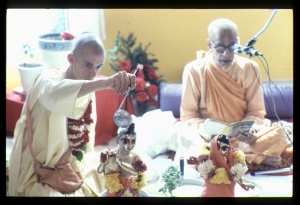CC Madhya 7.104: Difference between revisions
m (1 revision(s)) |
No edit summary |
||
| Line 1: | Line 1: | ||
{{ | [[Category:Sri Caitanya-caritamrta - Madhya-lila Chapter 07|C104]] | ||
<div style="float:left">'''[[Sri Caitanya-caritamrta|Śrī Caitanya-caritāmṛta]] - [[CC Madhya|Madhya-līlā]] - [[CC Madhya 7|Chapter 7: The Lord Begins His Tour of South India]]'''</div> | |||
<div style="float:right">[[File:Go-previous.png|link=CC Madhya 7.103|Madhya-līlā 7.103]] '''[[CC Madhya 7.103|Madhya-līlā 7.103]] - [[CC Madhya 7.105|Madhya-līlā 7.105]]''' [[File:Go-next.png|link=CC Madhya 7.105|Madhya-līlā 7.105]]</div> | |||
{{CompareVersions|CC|Madhya 7.104|CC 1975|CC 1996}} | |||
{{RandomImage}} | |||
==== TEXT 104 ==== | ==== TEXT 104 ==== | ||
<div | <div class="verse"> | ||
sei yāi’ āra grāme kare upadeśa | :sei yāi’ āra grāme kare upadeśa | ||
ei-mata ‘vaiṣṇava’ haila saba dakṣiṇa-deśa | :ei-mata ‘vaiṣṇava’ haila saba dakṣiṇa-deśa | ||
</div> | </div> | ||
| Line 12: | Line 16: | ||
==== SYNONYMS ==== | ==== SYNONYMS ==== | ||
<div | <div class="synonyms"> | ||
''sei''—that man; ''yāi’''—going; ''āra''—different; ''grāme''—to the villages; ''kare''—gives; ''upadeśa''—instruction; ''ei-mata''—in this way; ''vaiṣṇava''—devotees; ''haila''—became; ''saba''—all; ''dakṣiṇa-deśa''—the people of South India. | |||
</div> | </div> | ||
| Line 19: | Line 23: | ||
==== TRANSLATION ==== | ==== TRANSLATION ==== | ||
<div | <div class="translation"> | ||
In this way, as empowered men went from one village to another, all the people of South India became devotees. | In this way, as empowered men went from one village to another, all the people of South India became devotees. | ||
</div> | </div> | ||
__NOTOC__ | |||
<div style="float:right; clear:both;">[[File:Go-previous.png|link=CC Madhya 7.103|Madhya-līlā 7.103]] '''[[CC Madhya 7.103|Madhya-līlā 7.103]] - [[CC Madhya 7.105|Madhya-līlā 7.105]]''' [[File:Go-next.png|link=CC Madhya 7.105|Madhya-līlā 7.105]]</div> | |||
__NOTOC__ | |||
__NOEDITSECTION__ | |||
Revision as of 07:39, 8 August 2021

His Divine Grace
A.C. Bhaktivedanta Swami Prabhupada
A.C. Bhaktivedanta Swami Prabhupada
TEXT 104
- sei yāi’ āra grāme kare upadeśa
- ei-mata ‘vaiṣṇava’ haila saba dakṣiṇa-deśa
SYNONYMS
sei—that man; yāi’—going; āra—different; grāme—to the villages; kare—gives; upadeśa—instruction; ei-mata—in this way; vaiṣṇava—devotees; haila—became; saba—all; dakṣiṇa-deśa—the people of South India.
TRANSLATION
In this way, as empowered men went from one village to another, all the people of South India became devotees.